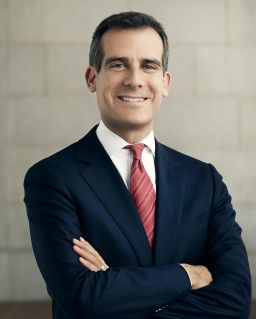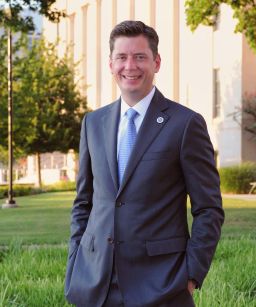Editor’s Note: Eric Garcetti, a Democrat, is the mayor of Los Angeles. David Holt, a Republican, is the mayor of Oklahoma City. Mark McClellan, M.D. is the founding director of the Duke-Margolis Center for Health Policy at Duke University and served as FDA commissioner and administrator of the Centers for Medicare and Medicaid Services. The opinions expressed in this commentary are their own. View more opinion on CNN.
Americans are hearing a lot from mayors and doctors right now, in the crucible of a public health emergency unlike any seen in the United States since the 1918 flu pandemic a century ago.
This partnership is playing out in communities across the country: physicians are treating patients affected by the Covid-19 surge and dispensing advice on how to do it better, and elected leaders are welcoming that guidance in hopes of saving more lives.



Public health experts are coalescing around the belief that a return toward normalcy demands a robust system of testing patients, tracing contacts of those infected and quarantining those who have the virus or have been directly exposed. Some of this is already being done, but not at the scale necessary to restore a version of our previous lives.
We know that some of the worst days of this crisis are ahead, as cases and deaths continue to grow. But there are encouraging signs that swift action by local leaders, rooted in close collaboration with health-care experts, is flattening the curve. The credit goes to the American people – who are embracing the science, making the sacrifices and now asking: What’s next? How can we get more of our lives and economy back, in a way that keeps us prepared and guards against future waves of the coronavirus?
Congress is considering further legislation to help the country respond, with an appropriate focus on addressing the economic devastation and health-care needs facing our communities right now. Local communities are also working to combat the economic effects of Covid-19, like in Oklahoma City, where their Small Business Continuity Program is providing $5.5 million in grants and loans to small businesses.
But on top of those steps, we need a more robust approach and a brand new infrastructure to meet this moment and forge a stronger future.
To lead this mission, we propose the creation of a CARES Corps: a coalition of local governments and workers, city and county health agencies working with health-care professionals and businesses – all backed by federal leadership and funding, built to stop Covid-19 and rebuild our economy. There are clear precedents for this bold approach: from the Cold War to the War on Poverty, our national leaders have enlisted us to join causes larger than ourselves with initiatives like the Peace Corps and the Teacher Corps.
A CARES Corps would leave our generation’s mark on history by helping make our country safer and accelerate economic recovery for main streets across America.
Whether we are talking about 1918 or 2020, we know that a return to good health and prosperity is paved with fast action, deep collaboration and methodical planning on a level that national governments can build and local officials can execute.
With history as our guide and the current crisis driving our action, Congress should focus the CARES Corps on three core elements: equipping public health professionals with the tools to support and scale up a national testing system; addressing budget shortfalls in our cities so we can prevent dramatic reductions in vital services; and uniting government officials with local workers and businesses around actions on unemployment insurance, job training and loan programs, so each solution matches the needs of every community.
This approach would be a real stimulus package – spurring the effective response to Covid-19 and long-term economic revitalization our country desperately needs. And its work would be built on six pillars:
1. Testing. We need to bring widespread, rapid testing to everyone with Covid-19 symptoms – and testing for asymptomatic people in settings with significant risks of transmission. There should be strong national standards for the quality and reliability of tests, and federal financial support and coverage requirements to guarantee supplies are affordable and widely available.
2. Real-time surveillance to detect and prevent new outbreaks. We need to link test results to a surveillance network – so that Covid-19 can be tracked in real time, and we can quickly detect new hotspots, track the success of interventions, and keep Americans informed. Federal support through the Centers for Disease Control and Prevention (CDC) should enable this to happen, with funds for state and local surveillance paired with electronic data sharing.
3. Rapid response to new cases. It is not enough to know where new cases are. We need a greater ability to quickly isolate cases, trace and communicate with contacts, and quarantine non-immune individuals who have been exposed to Covid-19. This will require rapid training and repurposing some workers into urgently needed new jobs.
4. Hospital capacity. From the beginning of this outbreak, it’s been clear that our nation is woefully short on hospital beds. Cities from L.A. and Seattle to New Orleans and New York City have found innovative ways to ease the burden on medical facilities like engaging local manufacturers to repurpose their manufacturing facilities to make PPE and face coverings, repurposing parks and convention centers as emergency facilities, and asking the federal government to deploy hospital ships. But we shouldn’t have to scramble like this. We need a nationwide push to grow the capacity in ICUs, emergency rooms and supplies for anywhere that the next wave of the coronavirus might strike.
5. Blood testing. Blood testing for immunity can help identify Americans who could serve in workplaces, classrooms, and roles that may otherwise create significant risk of transmission. The supply and quality of existing antibody tests aren’t good enough for this critical purpose. We need a better ability to accurately measure antibodies to the virus and understand how test results translate into actual immunity. And we need production of these tests to be expedited across the nation and distribution to be coordinated so that cities of every size can benefit.
6. Ongoing research and development. Our country has repeatedly made pathbreaking discoveries by combining the knowledge of top scientists with the catalyzing force of federally-backed research and development. The CDC and other agencies should support standardized data collection and collaborate more closely with states, universities and labs to learn more about treatments and how to use them in practice – and then help disseminate this information to medical professionals. The data should include reliable racial, ethnic, economic and other demographic information that allows us to more effectively target outreach and resources for those who need it most.
There is real-time evidence that this approach can make an immediate difference: in Los Angeles, a partnership between the city and county is helping residents, community-based organizations, and businesses access critical resources that can be the difference between ruin and recovery.
San Francisco Mayor London Breed is leading an aggressive response that deploys municipal employees alongside medical students to help quickly track and trace cases and contacts in that city.
This kind of strategic approach needs to happen in cities and counties across our country.
The response to any major emergency in the United States works best when we fuse the scale of federal leadership with public health and health-care expertise, and the trusted delivery of resources that’s defined local governments’ response to this outbreak. We haven’t done that yet, but the loss of life we have already experienced shows the urgency of timely and strategic federal action.
When our nation has faced sudden shocks in the past – whether the attack on Pearl Harbor or the terror of 9/11 – we’ve met them by putting the full power of American ingenuity and the full force of our communities to work in the lives of our people.
If our national leaders look to our local strategies, they’ll find models for doing so again – examples of the meaningful reform and lasting recovery that Americans will expect once we are on the other side of this crisis.


